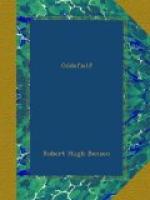The principal witnesses, even before Oates, were Dugdale and Turberville. First these gave their general testimony—and afterwards their particular. Mr. Dugdale related how that the plot, in general, had been on hand for above fifteen or sixteen years; and he repeated all the stuff that had so stirred up the people before, as to indulgences and pardons promised by the Pope to those who would kill the King. I must confess that I fell asleep once or twice during this testifying, for I knew it all by heart already. And, in particular, he said that my Lord had debated with others at my Lord Aston’s, how to kill the King: and that himself was present at such debates.
A great hum broke out in the Hall, when Dugdale swore that he had heard with his own ears my Lord Stafford and others who had been present, give their assent one by one to the King’s murder. His Majesty himself, I was told later by Mr. Chiffinch, retired to the back of his box to laugh, when he heard that said; for neither then nor ever did he believe a word of it.
Next came Mr. Oates; and he too reaffirmed what he had said before, with an hundred ingenious additions and particularities as to times and places—and this, I think, as much as anything was the reason why so many simple folk had believed him in the first event.
Then Turberville, who said falsely that he had once been a friar, and at Douay, related how my Lord, as he had said, had attempted to bribe him to kill the King, and suchlike nonsense. This, he said, had happened in France.
My Lord Stafford questioned the prisoners a little; and shewed up many holes in their story. For instance, he asked Turberville whether he had ever been in his chamber in Paris; and put this question through the High Steward.
“Yes, my Lord, I have,” said Turberville.
“What kind of a room is it?” asked my Lord.
“I can’t remember that,” said Turberville, who before had sworn he had been in it many times.
“No,” said my Lord, “I dare swear you can’t.”
“I cannot tell the particulars—what stools and chairs were in the room.”
* * * * *
On the third day, which was Thursday, my Lord was bidden to call his witnesses and make his defence; and I must confess that he did not do this very well; for, first he made a great pother about this and that statute, of the 13 Charles II. and 25 Edward—nothing of which served him at all; and next his witnesses did him harm rather than good; and Dugdale, whom he examined was so clever and quiet and positive in his statements that it was mere oath against oath. Third, my Lord Stafford himself did appear a little confused as to whether he had known Dugdale or not, not being sure of him, as he said, in his periwig; for when Dugdale was bailiff to my Lord Aston at Tixall, he wore no such thing. All that he did, in regard to Dugdale, was to shew by one of his witnesses that Dugdale, when bailiff at Tixall, had been a mean dishonest fellow; but then, as the Lord High Sheriff observed, it would scarcely be an honest man whom one would bribe to kill the King.




